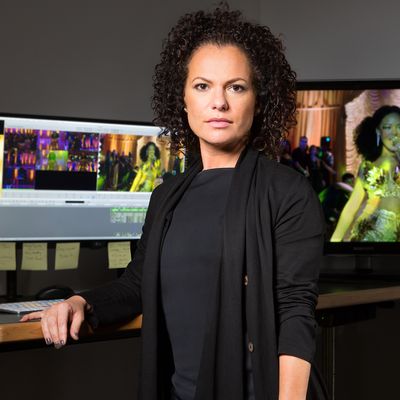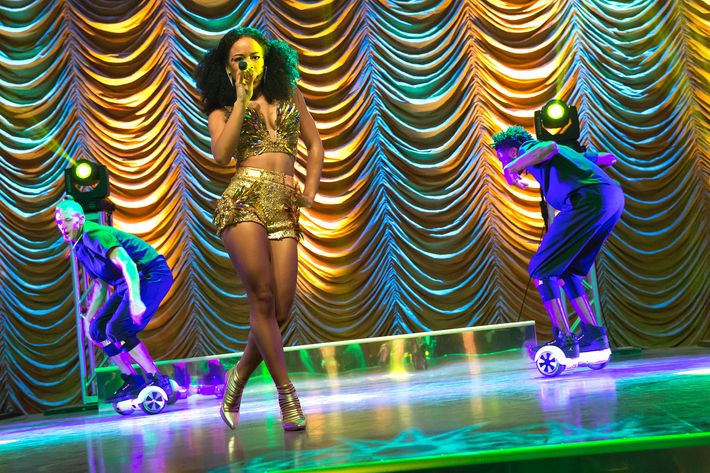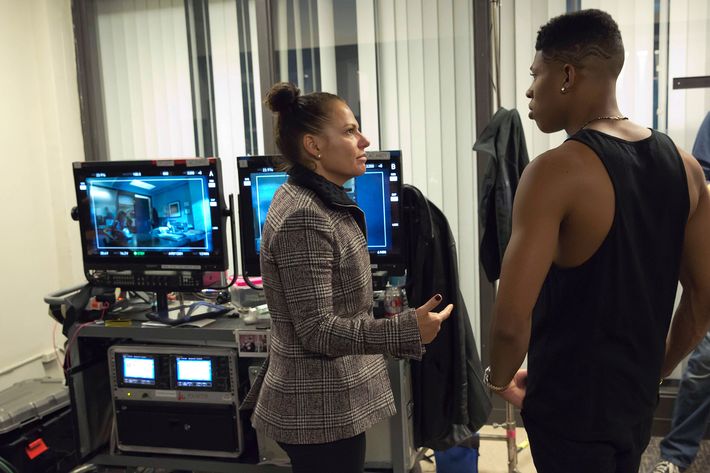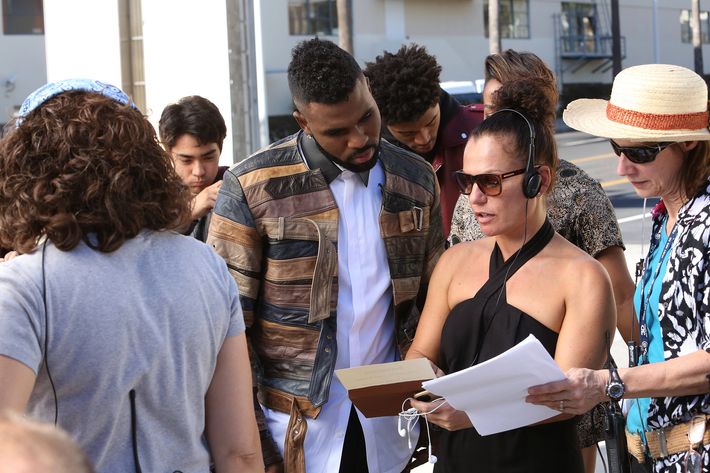
Tiana’s club performance of “Do Something With It” on last night’s mid-season finale of Empire was, like most Empire performances, flashy. But director Sanaa Hamri wanted something to make it unforgettable.
“Hoverboards!” Hamri, also an executive producer on the show, said while editing the scene in the show’s Beverly Hills production office in late October. She recalled sharing her idea to incorporate the trendy electric scooters with choreographer Jamaica Craft. “She looked at me and went, ‘What?’ and I started doing weird movements. I looked crazy, but she somehow understands my interpretive dancing. It looks like I’m a rain man. I wanted the dancers to slide.”
It’s what Craft has come to expect working with Hamri, who holds an unusual executive-producing position on Empire, acting as the musical liaison between the writers room, the music producers, actors, and performers. In essence, she is Empire’s conductor — working closely with Timbaland and his team of music producers, including Ne-Yo and Swizz Beatz, to shape their songs; and with Craft, the actors, and other directors to stage huge concert performances, studio recording sessions, rehearsals, or intimate jam sessions. Usually, Craft explained, their conversations begin with Hamri playing music in her office and dancing along to show Craft what she’s going for visually.
“Every performance is dope with Sanaa,” said Craft, who has worked with artists like Usher and Justin Bieber on music videos and concert tours. “It’s not just about the hoverboards. She knows the kinds of feelings she wants from the actors in the moment. In that performance with Tiana, it was very challenging for the dancers because working with an electrical prop that moves — it’s all about your weight and you’re trying to move. It’s like rubbing your head and tapping your stomach at the same time. But it was such a groundbreaking element to add to the dancing.”

Hamri feels like she prepared for this job all her life. The Fox hit capitalizes on her entire body of work in a way that no other show-business job could — from her start as a self-taught video editor to directing music videos, and later, television and films. The latter didn’t come until she worked on the remix video for “Thank God I Found You” with Mariah Carey, who planted an important seed: She told Hamri she should become a director.
“[Mariah] had never encountered a multicultural woman who was from somewhere else who edited music videos,” said Hamri, 41, who was born and raised in Tangier, Morocco. “It was a field that was mainly taken over by males, and to this day, it’s the same. When you have people who believe in you, it helps you go further as long as you stay within the vision of what you have for yourself.” At the time, Hamri was swiftly becoming a go-to bicoastal music-video editor, working with artists like Eminem, Dr. Dre, and Prince and developing her own style. Inspired by art and Italian cinema of the ‘50s and ‘60s, Hamri’s work is vivid; she attributes it to her photographic memory of colors, which she keeps a running catalogue of in her head.
“Very quickly, I started to feel contained by the three minutes,” Hamri said of directing music videos. “I wanted to tell bigger stories.”
Focus Features gave Hamri her first opportunity with Something New, a 2006 romantic drama about a woman (Sanaa Latham) in a love triangle with two men, played by Blair Underwood and Simon Baker. Directing that movie led to episodic television gigs on shows from Desperate Housewives to Rectify, and two more movies: The Sisterhood of the Traveling Pants 2 in 2008 and Just Wright in 2010.
“When I was on the set of Something New, I realized why I had gone through all of this,” Hamri said. “I felt confined in music videos and so comfortable on the movie set. That’s kind of where I am right now, too: I live and breathe Empire.”
“There’s always some great flourish Sanaa brings,” Empire showrunner Ilene Chaiken said of Hamri’s visual sensibility. “She really knows how to tell a story — she’s a consummate artist–television director because she knows how to land the moment.” Chaiken points to the November 18 episode, directed by Hamri. In it, Jamal (Jussie Smollett) fuses two songs together — one by each of his parents, Cookie (Taraji P. Henson) and Lucious (Terrence Howard) — to create “Ready to Go,” the song that lands him a Pepsi sponsorship after he performs it live for the company’s executives.
“When you direct, you can make it as big or as small as you want,” Hamri said. “That scene wasn’t supposed to be that big. But as I was prepping, I realized we don’t see a lot of live instrumentation on network television. It was important for me because I wanted viewers to see live music being played, to understand the instrumentation, to understand the bass, to understand the drum. That’s what is special about this show: You have a window into the music industry and into music that you haven’t seen before on TV.”
At their first meeting, Chaiken said, Hamri brought visuals she had put together to evoke what environment these characters live in, and how fashion and design factors into their world. “I wanted to immediately hire her as a producing director because she so clearly knew the world, and knew it much more intimately than anybody else I had talked to,” Chaiken said. “She made me feel excited about the visual potential of the show, and on top of that, she set the template for the musical numbers.”

The only child of Moroccan painter Mohamed Hamri and Blanche Hamri, a Jewish-American who worked at the American School of Tangier, Hamri had a multicultural upbringing that exposed her to the arts from an early age. “The Matisses of the world would go to Tangier to paint,” she said. “That type of thing really influenced me as a young child. Moroccan culture is very visual and has a lot of design and lines and light. I don’t think I was aware of it when I was young, but I know now it was feeding my mind in terms of finding a creative outlets that is visual and sonic as well.”
Hamri attended the American School, where she was often the only girl at a time when drug trafficking and political unrest made Tangier a dangerous place to live. “If you survive that environment as a woman and a free thinker, you go elsewhere and it’s easy — I didn’t grow up wealthy, and the street environment taught me a lot,” Hamri explained. “You don’t need a college degree to be part of the music industry. You can come off right off the streets and build an empire, which is what Lucious Lyon did, and a lot of the rappers that I knew. I was able to relate to them because there was a commonality of street smarts, of survival of the fittest and of being able to achieve greatness no matter what.”
As a child, Hamri listened to Madonna, Prince, Michael Jackson, U2, and Sufi music from Joujouka, her father’s childhood village, on a “rinky-dinky radio.” In her bedroom, she’d write down the lyrics and study each musical section. “Once a week, we’d get music videos from Spain or America. That was my favorite thing to watch,” she said. “I didn’t write music, but I was always interested in speaking to many people at once. There was something about the idea of finding ways to indicate thought by speaking through something.”
At 17, Hamri came to the States to attend Sarah Lawrence College, where she got her degree in theater arts, and later moved to New York City. A friend connected her with Malik Hassan Sayeed, who was filming music videos and needed a receptionist for his postproduction office. Sayeed was using the just-released Avid video-editing machines to work on his videos, which caught Hamri’s eye. In her downtime, she learned how to edit by following the manual.
“I started taking videos he had shot — big videos, like Missy Elliot and Blackstreet — and doing my own versions,” Hamri recalled. “One time, Malik came back from Los Angeles and he asked, ‘Who cut this?’ He started looking at my videos and told me I could be an editor.” That led to jobs editing videos for Paul Hunter, Hype Williams, and Brett Ratner. “They were the masters at that time, when hip-hop and pop culture exploded.”
Hamri’s work in the ‘90s, and later, with artists like Nicki Minaj and Common, made her crucial to Empire, Chaiken said. “I really rely on Sanaa to make the great choices and to communicate to the songwriters who are creating the music for the show what it is we are looking for,” she said. “She has the vocabulary for it. She knows the references. She can speak to the history of the music and she’s completely au courant with the music.”
Hamri directed the video for Nicki Minaj’s “Superbass” in 2010.
This season, Empire upped its musical production by showcasing four or five songs per episode instead of last season’s two or three. The process can be “like placing an order,” says executive music producer Timbaland. “We need ten hot dogs. It’s like beats to-go.”
He’s only slightly exaggerating. As the writers work on a script, they identify the musical numbers in the episode, and a smaller group is then tasked with talking to Hamri and Fox’s music team about the types of songs the story in the episode requires. Sometimes three or four different versions of a particular song are needed because a character is in the process of creating it in the episode. One constant: The song has to keep the scene moving.

“Once I talk to the writers, I go to the music producers and tell them what’s going on in the scene, how I’m filming [it], or [what] the vibe is,” Hamri said. “I tell them it needs to reference this and this and this. Then they send me a demo and I fine-tune it with them. The ultimate test, though, is when it gets sent to [co-creator] Lee Daniels. He hears it cleanly with no influence and has the final say on what songs get placed on the show.”
Timbaland and Hamri had never met before Empire. Now, he refers to her as “my dog.” “Me and Sanaa speak a certain language,” he said. Fox, meanwhile, “is learning.” “It’s a process. It’s a second season. We are doing a great job with the barriers. We are breaking through. Could we do better in our eyes? Yeah. But we’re not trying to fix nothing that ain’t broke.” Hamri echoed Chaiken: Fox relies on her and Timbaland to guide the show musically, as nobody else on staff has ever worked in the music industry. “They know what they don’t know.”
Today, Hamri has the respect of her colleagues, who describe her as wickedly organized and potently creative. But coming up as a young woman in the hip-hop and film industries, Hamri easily acknowledges there were obstacles to success in the two male-driven fields. Mostly, though, she views it as a reality she was uniquely positioned to thrive within: Growing up in Tangier, there were plenty of restrictions based on gender. “It’s serving me well in Hollywood because directors are mostly male,” she said. “And a lot of those things you grow up with in a male-dominated society? It makes you fearless.”
Additional reporting by Erik Parker.

